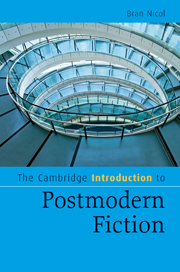Book contents
- Frontmatter
- Contents
- Acknowledgements
- Preface: reading postmodern fiction
- Introduction: postmodernism and postmodernity
- Chapter 1 Postmodern fiction: theory and practice
- Chapter 2 Early postmodern fiction: Beckett, Borges, and Burroughs
- Chapter 3 US metafiction: Coover, Barth, Nabokov, Vonnegut, Pynchon
- Chapter 4 The postmodern historical novel: Fowles, Barnes, Swift
- Chapter 5 Postmodern-postcolonial fiction
- Chapter 6 Postmodern fiction by women: Carter, Atwood, Acker
- Chapter 7 Two postmodern genres: cyberpunk and ‘metaphysical’ detective fiction
- Chapter 8 Fiction of the ‘postmodern condition’: Ballard, DeLillo, Ellis
- References
- Index
- Cambridge Introduction to …
Chapter 1 - Postmodern fiction: theory and practice
Published online by Cambridge University Press: 05 June 2012
- Frontmatter
- Contents
- Acknowledgements
- Preface: reading postmodern fiction
- Introduction: postmodernism and postmodernity
- Chapter 1 Postmodern fiction: theory and practice
- Chapter 2 Early postmodern fiction: Beckett, Borges, and Burroughs
- Chapter 3 US metafiction: Coover, Barth, Nabokov, Vonnegut, Pynchon
- Chapter 4 The postmodern historical novel: Fowles, Barnes, Swift
- Chapter 5 Postmodern-postcolonial fiction
- Chapter 6 Postmodern fiction by women: Carter, Atwood, Acker
- Chapter 7 Two postmodern genres: cyberpunk and ‘metaphysical’ detective fiction
- Chapter 8 Fiction of the ‘postmodern condition’: Ballard, DeLillo, Ellis
- References
- Index
- Cambridge Introduction to …
Summary
Postmodern fiction can be considered as a response to the kind of socio-historical changes discussed in the previous chapter. Larry McCaffrey, for example, argues that with the assassination of President J. F. Kennedy on 22 November 1963, ‘[p]ostmodernism was officially ushered in – at least in the United States – since that was the day that symbolically signaled the end of a certain kind of optimism and naïvete in our collective unconsciousness, the end of certain verities and assurances that had helped shape our notion of what fiction should be’ (McCaffrey, 1986, xii).
There can be no doubt that literary change works ‘symptomatically’, as a result of what occurs at a wider social and cultural level. But if there is any validity in the category ‘postmodern fiction’ it comes from using it for more than simply identifying particular related themes within a group of texts. Likewise, as well as being a symptom of wide-ranging cultural change, postmodern fiction needs to be understood in terms of specific currents within literary theory and practice. This means considering postmodern fiction in terms of form rather than context, assessing how social and cultural change might prompt changes in what fiction does and how it positions its readers to respond to it. This is the aim of this chapter, which is divided into three main sections.
- Type
- Chapter
- Information
- The Cambridge Introduction to Postmodern Fiction , pp. 17 - 49Publisher: Cambridge University PressPrint publication year: 2009



